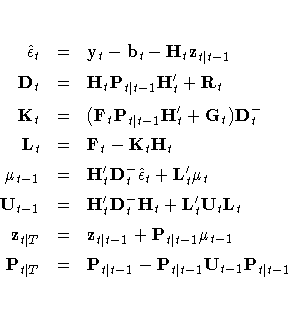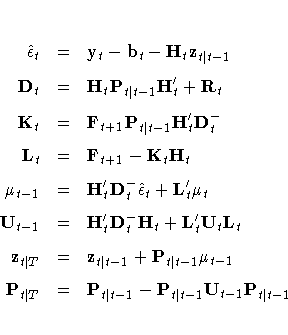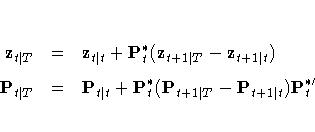KALCVS Call
- CALL KALCVS( sm, vsm, data, a, f, b, h,
var, pred, vpred <,un, vun>);
The KALCVS call uses backward recursions to compute the smoothed
estimate  and its covariance matrix,
and its covariance matrix,  ,
where T is the number of observations in the complete data set.
,
where T is the number of observations in the complete data set.
The inputs to the KALCVS subroutine are as follows:
- data
- is a T ×Ny matrix containing
data (y1, ... , yT)'.
- a
- is an Nz ×1 vector for a time-invariant input
vector in the transition equation, or a TNz ×1
vector containing input vectors in the transition equation.
- f
- is an Nz ×Nz matrix for a time-invariant
transition matrix in the transition equation, or a
TNz ×Nz matrix containing T transition matrices.
- b
- is an Ny ×1 vector for a time-invariant input vector
in the measurement equation, or a TNy ×1 vector
containing input vectors in the measurement equation.
- h
- is an Ny ×Nz matrix for a time-invariant
measurement matrix in the measurement equation, or
a TNy ×Nz matrix containing T time
variant Ht matrices in the measurement equation.
- var
- is an (Ny + Nz) ×(Ny + Nz) covariance matrix
for the errors in the transition and the measurement
equations, or a T(Ny + Nz) ×(Ny + Nz)
matrix containing covariance matrices in the transition
equation and measurement equation noises, that is,
 .
.
- pred
- is a T ×Nz matrix containing one-step
forecasts
 .
.
- vpred
- is a TNz ×Nz matrix containing mean
square error matrices of predicted state vectors
 .
.
- un
- is an optional 1 ×Nz vector containing
 .The returned value is
.The returned value is  .
.
- vun
- is an optional Nz ×Nz matrix containing UT.
The returned value is U0.
The KALCVS call returns the following values:
- sm
- is a T ×Nz matrix containing smoothed state
vectors
 .
.
- vsm
- is a TNz ×Nz matrix containing covariance matrices of
smoothed state vectors
 .
.
When the Kalman filtering is performed in the
KALCVF call, the KALCVS call computes smoothed
state vectors and their covariance matrices.
The fixed-interval smoothing state vector at time t is
obtained by the conditional expectation given all observations.
The smoothing algorithm uses one-step forecasts and their
covariance matrices, which are given in the KALCVF call.
For notation,  is the smoothed value
of the state vector zt, and the mean
square error matrix is denoted
is the smoothed value
of the state vector zt, and the mean
square error matrix is denoted  .For smoothing,
.For smoothing,

where t = T, T-1, ... , 1.
The initial values are  and UT = 0.
and UT = 0.
When the SSM is specified using the
alternative transition equation

the fixed-interval smoothing is performed
using the following backward recursions:

where it is assumed that Gt = 0.
You can use the KALCVS call regardless of the specification
of the transition equation when Gt = 0.
Harvey (1989) gives the following fixed-interval
smoothing formula, which produces the same smoothed value:

where

under the shifted transition equation, but

under the alternative transition equation.
The KALCVS call is accompanied by the
KALCVF call, as shown in the following code.
Note that you do not need to specify UN and VUN.
call kalcvf(pred,vpred,filt,vfilt,y,0,a,f,b,h,var);
call kalcvs(sm,vsm,y,a,f,b,h,var,pred,vpred);
You can also compute the smoothed estimate and its
covariance matrix on an observation-by-observation basis.
When the SSM is time invariant, the
following example performs smoothing.
In this situation, you should initialize
UN and VUN as matrices of value 0.
call kalcvf(pred,vpred,filt,vfilt,y,0,a,f,b,h,var);
n = nrow(y);
nz = ncol(f);
un = j(1,nz,0);
vun = j(nz,nz,0);
do i = 1 to n;
y_i = y[n-i+1,];
pred_i = pred[n-i+1,];
vpred_i = vpred[(n-i)*nz+1:(n-i+1)*nz,];
call kalcvs(sm_i,vsm_i,y_i,a,f,b,h,var,pred_i,vpred_i,un,vun);
sm = sm_i // sm;
vsm = vsm_i // vsm;
end;
Copyright © 1999 by SAS Institute Inc., Cary, NC, USA. All rights reserved.





